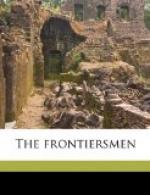All the Indians, however, were temperamentally averse to the services and tenets of the Christian religion, and Timberlake gives an instance among the Cherokees in 1760 in which a missionary was balked by a unique interruption. “Mr. Martin, who having preached Scripture till both he and his audience were heartily tired, was told at last that they knew very well that if they were good they would go up; if bad, down; that he could tell no more; that he had long plagued them with what they no ways understood, and they desired that he would depart the country.”
The epitome of theology thus deduced was so far a just conclusion. But doubtless the Indians labored greatly with imperfect comprehension. Humboldt describes a service among a South American tribe, in which a missionary preaching in Spanish was at his wits’ end to make his audience differentiate between infierno and invierno. They persisted in shivering with horror at the picture of the hell of his warnings in which the wicked were supposed to be subjected to everlasting winter. One is tempted to think that the end might have justified the means if the good padre had fallen in with the prejudice against the rainy season and adopted, in lieu of the fire-and-brimstone of Scripture, as a future state of punishment, the icy Ninth Circle of Dante’s Inferno, where
“Eran l’ ombre
dolenti nella ghiaccia,
Mettendo i denti in nota di
cicogna.”
5. Page 151. The cultivation of personal pride was an essential element of training among the Indians. They held the lower ranks of white people in great contempt, and Timberlake records that in some athletic diversions at which he and other members of the Virginia regiment were present they refused to play or to hold conference with any of the troops except the officers.
6. Page 179. The primary and somewhat complex significance of the word ada-wehi is suggested by the idea of sorcery,—a man, or animal, or even element endowed with uncontrolled superlative and supernatural powers. It has been stated that since the introduction of Christianity and the printing of the New Testament in the Cherokee typographical character the word has been utilized with its subtleties of signification to express spirit or angel. In this story, however, the scene of which is laid in a period long previous to the conversion of the tribe, or even the accepted date of the invention of the Cherokee alphabet, the word is used in its early and original sense to denote a magician of special and expansive gifts of sorcery.
7. Page 186. Although this officer’s name was regularly incorporated into the Cherokee vocabulary as a synonym of disaster, he seemed to revolt at the unhappy plight of the people whom in the discharge of his duty he had succeeded in reducing to so abject a condition of despair and woe, and has left on record expressions of compassion incongruous with his deeds and his position as a professed soldier of long experience. He had served in Flanders and Ireland in his youth as captain in the Royal Scots before he first came to America as major in Montgomerie’s regiment of Highlanders.




